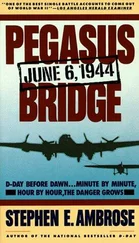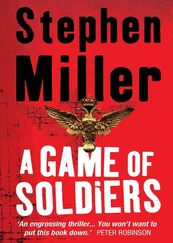Stephen Ambrose - Citizen Soldiers [Condensed]
Здесь есть возможность читать онлайн «Stephen Ambrose - Citizen Soldiers [Condensed]» весь текст электронной книги совершенно бесплатно (целиком полную версию без сокращений). В некоторых случаях можно слушать аудио, скачать через торрент в формате fb2 и присутствует краткое содержание. Жанр: История, на английском языке. Описание произведения, (предисловие) а так же отзывы посетителей доступны на портале библиотеки ЛибКат.
- Название:Citizen Soldiers [Condensed]
- Автор:
- Жанр:
- Год:неизвестен
- ISBN:нет данных
- Рейтинг книги:5 / 5. Голосов: 1
-
Избранное:Добавить в избранное
- Отзывы:
-
Ваша оценка:
- 100
- 1
- 2
- 3
- 4
- 5
Citizen Soldiers [Condensed]: краткое содержание, описание и аннотация
Предлагаем к чтению аннотацию, описание, краткое содержание или предисловие (зависит от того, что написал сам автор книги «Citizen Soldiers [Condensed]»). Если вы не нашли необходимую информацию о книге — напишите в комментариях, мы постараемся отыскать её.
Citizen Soldiers [Condensed] — читать онлайн бесплатно полную книгу (весь текст) целиком
Ниже представлен текст книги, разбитый по страницам. Система сохранения места последней прочитанной страницы, позволяет с удобством читать онлайн бесплатно книгу «Citizen Soldiers [Condensed]», без необходимости каждый раз заново искать на чём Вы остановились. Поставьте закладку, и сможете в любой момент перейти на страницу, на которой закончили чтение.
Интервал:
Закладка:
The Volkssturm, the Waffen SS, and the Hitler Youth were another matter. They fought fiercely and inflicted great damage. It was chaos and catastrophe, brought on for no reason-except that Hitler had raised these boys for just this moment.
The Allied fear was that Hitler would be able to encourage these armed bands to continue the struggle. His voice was his weapon. If he got to the Austrian Alps, he might be able to surround himself with SS troops and use the radio to put that voice into action.
Exactly that was happening, according to OSS agents in Switzerland. SHAEF G-2 agreed. As early as March 11, G-2 had declared, "The main trend of German defence policy does seem directed primarily to the safeguarding of the Alpine Zone. This area is practically impenetrable. Evidence indicates that considerable numbers of SS and specially chosen units are being systematically withdrawn to Austria. Here, defended by nature the powers that have hitherto guided Germany will survive to reorganize her resurrection. Here a specially selected corps of young men will be trained in guerrilla warfare, so that a whole underground army can be fitted and directed to liberate Germany."
Elsenhower's mission was to get a sharp, clean, quick end to the war. The Russians were going to take Berlin anyway. The best way to carry out the mission was to overrun Bavaria and Austria before the Germans could set up their Alpine redoubt. Eisenhower ordered Ninth Army to halt at the Elbe River, First Army to push on to Dresden on the Elbe and then halt, and Third Army and Seventh Army, plus the French army, to overrun Bavaria and Austria.
American POWs were a major concern. The Germans held 90,000 US airmen and soldiers in stalags scattered across central and southern Germany. Rescue missions became a primary goal.
WHEN THE POW camps were liberated, the GIs usually found the guards gone, the POWs awaiting them. The sight of an American or British soldier was a signal for an outburst of joy. Captain Pat Reid of the British army was in Colditz prison, a castle in a rural area of central Germany. The prisoners were Allied officers, "bad boys" to the Germans because they had escaped from other stalags. Colditz was supposed to be escape-proof, but these incorrigibles kept escaping (one via what may have been the world's first hang glider), although few made it to Switzerland. Reid described the moment on April 15, a day after the guards took off, when a single American soldier stood at the gate, "his belt and straps festooned with ammunition clips and grenades, sub-machine gun in hand." An Allied officer cautiously advanced towards him with outstretched hand. The GI took it, grinned, and said cheerfully, "Any doughboys here?"
"Suddenly, a mob was rushing towards him, shouting and cheering and struggling madly to reach him, to make sure that he was alive, to touch him, and from the touch to know again the miracle of living, to be men in their own right, freed from bondage. Men with tears streaming down their faces kissed the GI on both cheeks-the salute of brothers."
At Moosburg, Allied POWs who had been marched away from the oncoming Russians, under horrible conditions and at great risk, were gathered-some 110,000 of them, including 10,000 Americans. Major Elliott Viney of the British army was among the POWs. He kept a diary. April 29, 1945: "AMERICANS HERE! Three jeeps in the camp and all national flags hoisted. The boys brought in cigars, matches, lettuce and flour. The scenes have been almost indescribable. Wireless blaring everywhere, wire coming down, wearing Goon bayonets and caps. The SS put a panzerfaust through the guard company's barracks when they refused to fight."
To most German soldiers the sight of a GI or Tommy standing in front of them was almost as welcome an event as it was for the POWs. Those who surrendered safely thought themselves among the luckiest men alive. In mid-April, Sergeant Egger recalled, "I fired at a deer in the evening while hunting but missed, and five German soldiers came out of the woods with their hands up. I bet they thought we had excellent vision."
On the autobahns German troops marched west on the median, while Americans on tanks, trucks, and jeeps rolled east. Sergeant Gordon Carson, heading towards Salzburg, recalled that "as far as you could see in the median were German prisoners, fully armed. No one would stop to take their surrender. We just waved." Private Webster couldn't get over the sight of the Germans, "coming in from the hills like sheep to surrender." He recalled "the unbelievable spectacle of two GIs keeping watch on some 2,500 enemy."
The 101st was riding in DUKWs. Most GIs were riding on vehicles of every description, always heading east. A few infantry, however, were still slogging forward the same way they had crossed France and Belgium and the Rhineland-by foot. "We walked another twenty-five miles today," Sergeant Egger recorded on April 20. "Naturally the men were complaining, but I always preferred walking to fighting."
Sometimes they had to fight. On April 27, G Company came to Deggendorf, northeast of Munich. There were some Hitler Youth in the town of 15,000. They had machine guns and panzerfausts, and they let go. "The bullets sounded like angry bees overhead," Egger wrote. American artillery destroyed the hive. Later, in the by then destroyed town, one of his buddies said to him, "The thought of being killed by some fanatical thirteen-year-old scares the hell out of me. After coming this far I don't want to die now."
AS THE TOMMIES and GIs moved deeper into Germany, they made discoveries that brought on a great change in attitude towards Germany and its people. On April 11 the 3rd Armoured Division got into Nordhausen, on the southern side of the Harz Mountains. Captain Belton Cooper was near the van as the GIs worked their way into town. Suddenly "a strange apparition emerged from the side of one of the buildings. A tall frail-looking creature with striped pants and naked from the waist up. It appeared to be a human skeleton with little signs of flesh, if any. The skin appeared to be like a translucent plastic stretched over the rib cage and sucked with a powerful vacuum until it impinged to the backbone in the rear. I could not tell whether it was male or female. There was no face, merely a gaunt human skull staring out. The teeth were exposed in a broad grin and in place of eyes were merely dark sockets. I did not see how it was humanly possible for this pathetic creature to have enough strength to walk. As we proceeded down the road, we encountered more and more of these gaunt figures standing or sitting but most of them were sprawled on the road where they had collapsed."
Cooper came to a warehouse where German civilians were plundering. "The crowd was ravenous; they were pushing and shoving. They paid absolutely no attention to the poor pitiful wretches lying in the streets." Further on "we passed three large stacks of what appeared to be wastepaper and garbage piled in rows six feet high and four hundred feet long. The stench was overwhelming and as I looked I noticed that parts of the stack were moving. To my absolute horror, it dawned on me that these stacks contained the bodies of naked human beings. A few were still alive."
General Collins ordered that every civilian in Nordhausen must work around the clock until the bodies were buried. Bulldozers came forward to dig a mass grave. Later Cooper discovered the V-2 rocket factory where the slave labourers worked until they starved. East of Nordhausen he came across a schoolhouse with some trees around it. On closer examination it turned out to be a rocket assembly plant. The trees were aluminium fuel tanks piled on each other and covered with camouflage nets.
Lieutenant Hugh Carey, who became governor of New York in the 1980s, was at Nordhausen on April 11. Thirty years later he wrote,'"! stood with other American soldiers before Nordhausen. I inhaled the stench of death, and the barbaric, calculated cruelty. I made a vow as I stood there that as long as I live, I will fight for peace, for the rights of mankind and against any form of hate, bias and prejudice."
Читать дальшеИнтервал:
Закладка:
Похожие книги на «Citizen Soldiers [Condensed]»
Представляем Вашему вниманию похожие книги на «Citizen Soldiers [Condensed]» списком для выбора. Мы отобрали схожую по названию и смыслу литературу в надежде предоставить читателям больше вариантов отыскать новые, интересные, ещё непрочитанные произведения.
Обсуждение, отзывы о книге «Citizen Soldiers [Condensed]» и просто собственные мнения читателей. Оставьте ваши комментарии, напишите, что Вы думаете о произведении, его смысле или главных героях. Укажите что конкретно понравилось, а что нет, и почему Вы так считаете.
![Stephen Ambrose Citizen Soldiers [Condensed] обложка книги](/books/346737/stephen-ambrose-citizen-soldiers-condensed-cover.webp)








